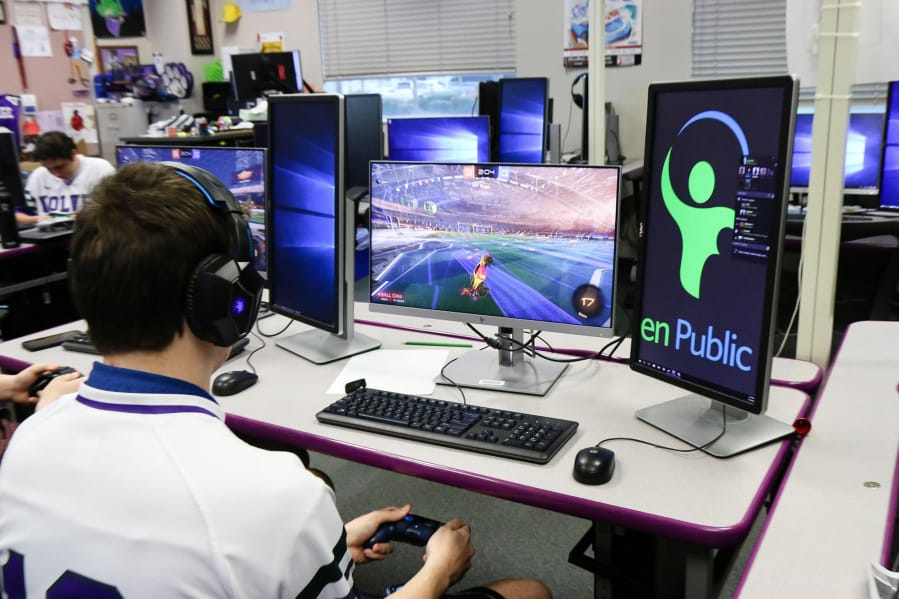Playing esports involves a lot of convincing.
Not convincing people to play, but convincing others that esports is a real sport, esports athletes are real athletes.
And most importantly, convincing parents.
“A big thing you have to do with esports is convince your parents to let you play on your computer for three hours every day,” said Heritage High School senior Hugh Haney.
But esports is not just about playing games, coach Chase Smith said. It’s about teaching students skills they can use in the classroom and their lives.
“We’re not building an esports team; we’re building an esports program,” said Smith, who teaches computer science and game design at Heritage. “And when I say an esports program, we’re not just teaching them to be athletes, competitive athletes. We’re teaching them life skills. We’re teaching them career industry. We’re teaching them all the different things inside esports that they can succeed at, no matter if it’s as an athlete, graphic design, web design and so much more.”
What began with Smith seeing some students play card games on campus led to the creation of a game club at Heritage, playing card and board games. Later, video games were added, which sparked the idea of starting an esports team.
Last school year, Heritage became one of seven schools in the state to offer an esports team. What started with 11 students from Heritage grew to 73 players last March, including students from Union, Mountain View and Evergreen high schools.
This fall, with traditional sports sidelined by the COVID-19 pandemic, Smith is seizing on the opportunity to get more schools around the region and the state to adopt esports teams, and he has the Washington Interscholastic Activities Association on his side.
WIAA assistant executive director Justin Kesterson said the WIAA adopted guidelines last year for adding a new sports or activity. It involved a two-year trial period during which 20 percent of the schools in the state must be participating in the activity in the first year, and 40 percent in the second year.
While only 14 schools had adopted esports teams at the start of the school year, 127 were interested in adding esports.
“That’s well within that 20 percent range,” Kesterson said. “So we’ve been working on finding the right platforms and creating guidelines for esports. If all goes well, we hope we can start that two-year trial in the spring of 2021.”
If esports takes off in other schools like it has at Heritage, that two-year trial should go well.
Smith said about two-thirds of the students who joined his esports program had never been involved in a club or other school activity before.
“I’m sure you can understand that a lot of people going into esports — people who play video games a lot and are really good at them — aren’t the most social people,” Haney said. “But that’s something that esports is stood upon. The concrete of esports is teamwork. It’s not just you playing a game. There is your team and you are one unit, and you have to communicate with your team.”
Most esports games involved three to five players on a team, working in unison. Practices involved not just playing the game, but receiving instruction from coaches and watching video of past games so players can learn from their mistakes.
The coaching aspect is so ingrained in the sport that several former Heritage students have decided to return this fall to serve as coaches for the high school team.
“Esports is about family,” said recent graduate Christian Ramirez, who is returning this fall as a coach. “You learn to depend on each other. I made a lot of friends from esports, and a lot of my best memories came from esports. So I’m glad Coach Smith gave me the opportunity to come back to my high school and give back to my community.”
Two other Heritage graduates, Justin Franklin and Dat Nguyen, are back as coaches, as well as trying to launch an esports program at their college, Washington State University-Vancouver.
“I spent a lot of years doing Boy Scouts, where I was fortunate enough to become an Eagle Scout,” Franklin said. “The skills we learned in Boy Scouts are things like communication, leadership and life skills. And there are a lot of those same skills embedded in esports, and we’re teaching that to all of our players.”
Ramirez said he has learned more about being a leader in one year of esports than he did in 14 years of playing baseball.
“It was big transition for me,” Ramirez said. “I was baseball, baseball, baseball, and now I’m all esports. I never really thought about what it takes to be an esports athlete, and honestly it’s a lot. I really think esports is more challenging than baseball ever was to me.”
On the baseball field, Ramirez said he would focus on his job. But in esports, because so many players are quiet in nature, he found himself having to step up and be a more vocal leader.
Being a team leader is a big challenge, Haney said.
“You have to pay attention to your game, and you have to pay attention to four other people’s game,” Haney said. “You have to form the strategy for the five of you, and hope to God, nobody back talks because that immediately breaks down the whole system. So to impose all of that on anti-social teenagers who like playing video games a lot alone in their room, then you’ve got some panic. But I’ve seen so much improvement in myself and my peers, in both categories, in leading and being led.”
And the supreme leader is Smith, who got the program started last spring by hosting tournaments with other high schools in the region and around the country. He also gave the Heritage kids a chance to compete against college teams.
“We lost, but I learned a lot,” Nguyen said. “That tournament ended up being one of my best memories for me at Heritage.”
Smith added both a fall and spring season of esports this school year, reducing the cost per season to $40 through agreements with different platforms. He has expanded the games players can play from four to 14 this year. And with students doing their schooling from home, the games being offered can be played on a variety of platforms — personal computer, Xbox, Playstation, Switch and even on a mobile phone.
Smith also set up visits from college coaches who offer the possibility of scholarships for esport athletes.
“I fell in love with esports,” Ramirez said. “I encourage everybody and anybody to give it a shot. There is so much you can learn, and so much you can do in esports.”
The program is open to any Evergreen Public Schools high school student and students can sign up through Sept. 26.
And if you need more convincing, just talk to Coach Smith.
“Mr. Smith has a passion for esports,” Haney said. “And it bleeds onto everyone.”
Smith added: “They’re right. I do have a passion. But it’s not for esports. It’s for the students.”
Be part of the team
What: Heritage High School esports team.
Who: Eligible to any Evergreen Public Schools high school student.
Cost: $40 a season, $80 for both fall and spring seasons.
When: The fall season runs October through December. Spring season runs February through May.
Contact: Students interested in joining the team or learning more can contact at chase.smith@evergreenps.org




